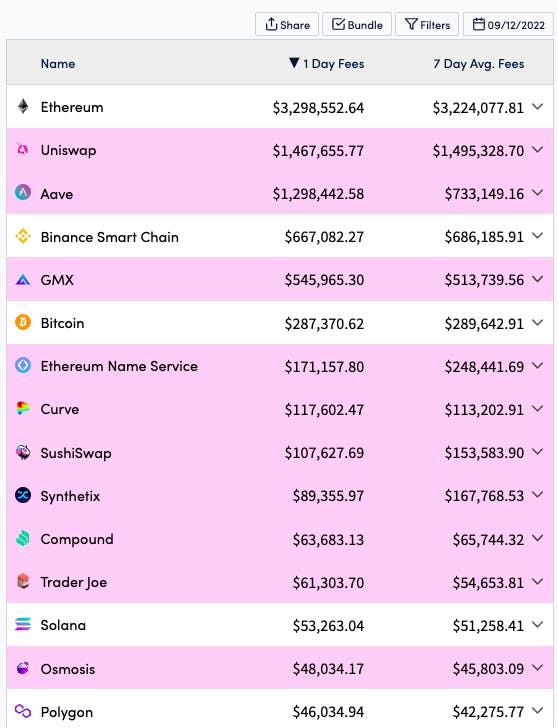Opinion: The greatest innovation introduced by blockchain
How economic incentives can change computing forever
Take a good look at the graphic below that lists the daily and weekly revenues of the top blockchain projects.

What stands out for you? What makes some of the earliest trustless blockchains like Bitcoin, ethereum and Filecoin so special? Let's go over some of the interesting candidates one by one.
What makes the success of these apps special and why?
humble "public good" beginnings? Blockchain, for the uninitiated - the idea that machines could run software that reach consensus on how a ledger is maintained between all parties in a transparent and efficient manner.
permissionless? The truly decentralized ones are permissionless - since they allow anyone to run a machine to join the network.
decentralized? for sure, not needing a centralized entity, and solving the "double spending" book-keeping on both sender and receiver.
transparent? all activities on the blockchain are publicly viewable and verifiable. thereby, adding a layer of trust for things like ownership, revenue-sharing and analytics
economic incentives? The machines that become part of the network have incentives to maintain the sanity of the ledger and progress it further. These are often called miners in a "proof of work" while "validators" in "proof of stake" blockchains.
Blockchains have shown us that not only is it not required to own and manage servers, but that we do not to if economic incentives are aligned to those who do want to manage them
Blockchains have shown us that not only is it not required to own and manage servers, but that we do not even need to manage them (the application doesn't have to, others will if the incentives are aligned).
the tech industry is undergoing change
- server: your code on servers you own, possibly in your own data centers
- shared: virtualization allowing sharing of resources across machines managed by cloud/data centers
- containers: just add machines, and allow the system to decide what to serve/host on which machine
- serverless: don't manage servers, just push code
And now we have
decentralized
- decentralized: whoever manages servers to run the code, gets incentivized
whoever manages servers to run the code, gets incentivized
That's right. We now live in a world, where a project like Uniswap was able to earn $3M in a single day, and the power of smart contracts & decentralization meant that they were not required to have a single machine for that work load.
Uber didn't need to own a car.
Airbnb didn't need to own a house.
Bitcoin/Ethereum/Uniswap doesn't need to own any servers.
Perhaps one day your app won't have to manage/host any servers, because somebody else will.
Just as software eats the world - running software in some industries will start to be left to miners/validators who seek the arbitrage of costs versus the economic incentives from the "proof of work" of running such open source software.
